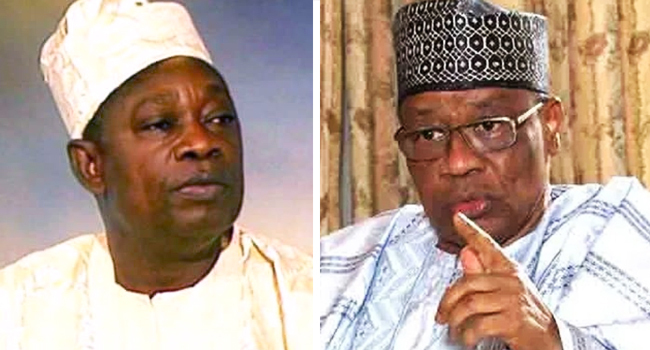A former military president of Nigeria, General Ibrahim Babangida (rtd.), has made a historic admission by confirming that the late Moshood Kashimawo Olawale (MKO) Abiola won the June 12, 1993, presidential election. This revelation came during the unveiling of his autobiography, A Journey in Service , in Abuja on Thursday. The acknowledgment marks a significant turning point in Babangida’s narrative and offers closure to a chapter that has long been contested in Nigeria’s political history.
In the book, Babangida described the annulment of the election as the most difficult decision of his life. While he had previously defended the annulment, citing reasons such as maintaining national stability and addressing alleged irregularities, this latest admission provides clarity on what many Nigerians have long believed to be true.
The June 12, 1993, election is widely regarded as one of the freest and fairest in Nigeria’s history. MKO Abiola, who ran on the platform of the Social Democratic Party (SDP), faced Bashir Tofa of the National Republican Convention (NRC). Early results indicated an overwhelming victory for Abiola, with reports showing he met all constitutional requirements to claim the presidency. These included securing the majority of votes and achieving the necessary geographical spread across the country.
However, before official results could be announced, Babangida’s administration annulled the election, plunging the nation into crisis. The move sparked widespread protests, international condemnation, and calls for democracy. It also set the stage for years of political turmoil, ultimately leading to the transition from military rule to civilian governance in 1999.
At the event where his autobiography was unveiled, former Vice President Yemi Osinbajo reviewed the book and shared excerpts highlighting Babangida’s candid reflections on the annulment. According to Osinbajo, Babangida wrote that there was “no doubt in my mind; MKO Abiola won the election. He satisfied all the requirements.”
This admission comes more than three decades after the controversial annulment and underscores the weight Babangida carried throughout his career regarding this decision. Despite its difficulty, Babangida expressed relief that former President Muhammadu Buhari posthumously honored Abiola with the Grand Commander of the Federal Republic (GCFR) title, a recognition typically reserved for Nigerian presidents. This gesture, Babangida noted, brought some measure of justice to Abiola’s legacy.
For many Nigerians, the annulment of the June 12 election remains a defining moment in the country’s struggle for democracy. It symbolized the tension between military authority and popular will, leaving scars that are still felt today. Babangida’s admission may not erase the pain caused by the annulment, but it does offer an opportunity for reflection and reconciliation.
The former military ruler acknowledged that the decision to annul the election was one of the hardest he ever made. In doing so, he humanized the process behind the choice, revealing the internal struggles that accompanied it. However, critics argue that this admission should have come sooner, potentially sparing the nation years of unrest and division.
Babangida’s admission serves as both a reckoning and a call for reconciliation. By recognizing Abiola’s victory, he validates the aspirations of millions of Nigerians who participated in the election and believed in its outcome. At the same time, it opens the door for further dialogue about Nigeria’s democratic journey and the lessons learned from past mistakes.
The posthumous award of the GCFR to Abiola by President Buhari in 2018 was a step toward acknowledging his contributions to the fight for democracy. Babangida’s acknowledgment now adds another layer to this recognition, reinforcing the importance of honoring historical truths.
As Nigeria continues to grapple with challenges in its democratic process, this moment offers valuable insights. It highlights the need for transparency, accountability, and respect for the will of the people in shaping the nation’s future. For younger generations unfamiliar with the events of 1993, Babangida’s admission serves as a reminder of the sacrifices made by those who fought for democracy.
Beyond personal vindication or historical correction, Babangida’s admission carries broader implications for Nigerian politics. It challenges current leaders to prioritize the principles of fairness, inclusivity, and integrity in governance. In an era marked by increasing skepticism toward electoral processes, this acknowledgment reinforces the importance of upholding democratic norms and respecting the outcomes of free and fair elections.
Moreover, it sets a precedent for other leaders to confront their own legacies honestly. Transparency in leadership fosters trust and strengthens institutions, paving the way for a more stable and prosperous society. As Nigeria looks ahead to future elections, the lessons of June 12, 1993, remain relevant reminders of the stakes involved in democratic transitions.
General Ibrahim Babangida’s admission that MKO Abiola won the June 12, 1993, election is a watershed moment in Nigeria’s history. It acknowledges a truth long held by many and offers a chance for healing and reconciliation. While the annulment of the election cannot be undone, Babangida’s words provide an opportunity to reflect on the progress made since then and the work still needed to ensure a truly democratic future.
As Nigeria moves forward, the lessons of this period must guide efforts to build stronger institutions, protect citizens’ rights, and promote unity. Babangida’s acknowledgment is not just about the past; it is also about the present and the future—a call to honor the sacrifices of those who fought for democracy and to create a nation worthy of their vision.



